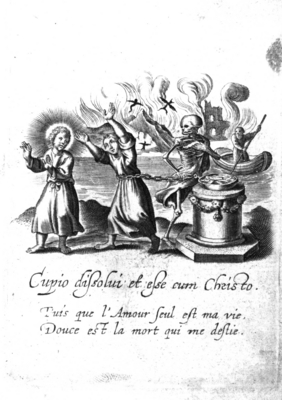Impatientia Amoris [65]

XXIII.
Rusbroch.
S.L. Iust.
HIc igitur Amor in supremo mentis fastigio
constitutus diuinæ lucis suæ radios in sitibun-
dam cordis appetentiam & affectum diffundens,
languorem efficit continuum & perseuerantem,
ita vt impatienter amare faciat, quæ impatientia
vbi dominium obtinet, modos omnes superat,
nec se aliquo certo modo contineri vel adstringi
patitur. siquidem modi omnis expers esse appe-
tit. qui sic amat vehementi cruciatur mortis desi-
derio, vt à corporis sui carcere absolutus, cum di-
lecto possit vniri nec atroces pœnas flammarum,
lampadum, carcerum, scorpionum, equuleorum,
& opprobriorum perpeti formidat, vt gratissimū
dilecto possit fieri hollocaustum. quis enim huius
sanctæ impatientiæ valet profectus explicare, ani-
mo quippe vires subministrat, mortem despicit,
sanctitatem adducit, coæquat martyribus, & cæ-
lesti patriâ dignum suum efficit possessorem. ope-
ra, namque eo fiunt superno Iudici gratiora, quo
ardentiori fuerint facta charitate.
HIc igitur Amor in supremo mentis fastigio
constitutus diuinæ lucis suæ radios in sitibun-
dam cordis appetentiam & affectum diffundens,
languorem efficit continuum & perseuerantem,
ita vt impatienter amare faciat, quæ impatientia
vbi dominium obtinet, modos omnes superat,
nec se aliquo certo modo contineri vel adstringi
patitur. siquidem modi omnis expers esse appe-
tit. qui sic amat vehementi cruciatur mortis desi-
derio, vt à corporis sui carcere absolutus, cum di-
lecto possit vniri nec atroces pœnas flammarum,
lampadum, carcerum, scorpionum, equuleorum,
& opprobriorum perpeti formidat, vt gratissimū
dilecto possit fieri hollocaustum. quis enim huius
sanctæ impatientiæ valet profectus explicare, ani-
mo quippe vires subministrat, mortem despicit,
sanctitatem adducit, coæquat martyribus, & cæ-
lesti patriâ dignum suum efficit possessorem. ope-
ra, namque eo fiunt superno Iudici gratiora, quo
ardentiori fuerint facta charitate.

Impatiençe de l'Amour.
XXIII.
Rompons, rompons ceste prison fascheuse,
Sortons, sortons de ceste vie honteuse,
Et que la mort detache ce chaisnon;
Il vaut bien mieux, cher amour, de te suiure,
Puis que celuy qui sans amour veut viure,
Il faut aussi qu' il viue sans raison.
XXIII.
Rompons, rompons ceste prison fascheuse,
Sortons, sortons de ceste vie honteuse,
Et que la mort detache ce chaisnon;
Il vaut bien mieux, cher amour, de te suiure,
Puis que celuy qui sans amour veut viure,
Il faut aussi qu' il viue sans raison.
Translations
 |
Impatience of love. |
 |
Therefore this love, living in the most upper region of the mind and emitting the rays of its divine light towards the thirsting
appetite and emotion of the heart, creates a continuous and lasting languor, in such a way that it makes love impatient,
an impatience that when it seizes dominion overcomes all other states of mind and does not suffer to be contained or constricted
in any definite way, since its desire is devoid of all measure. Who loves in such a way is wracked by desire for death, so
that free from the prison of his body he can be united with the beloved, and fears not to endure the frightful punishment
of flames, torches, dungeons, scorpions, the rack, and reproof, in order to become a holocaust1 most welcome to the beloved. For who can explain the advantage of this holy impatience, because it administers strength to
the heart, despises death, adduces holiness, makes one equal to the martyrs and makes its possessor worthy of heaven, the
fatherland. For deeds are so much dearer to the Highest Judge, the more passionately they are done out of love. |
 |
I wish to disintegrate and be with Christ. |
Literature
Sources and parallels
-
Choice between Christ's yoke and the wordly life leading to death in:Rectum judicium [4] (in: Georgette de Montenay/Anna Roemer Visscher, Cent emblemes chrestiens (c. 1615))
[Compare
![Compare [compare]](/static/images/compare2.gif) ]
]
-
Parallel for the pictura, the same Latin bible quote and the French epigram in:Wie zoekt de Vryheit niet [11] (in: Jan van Hoogstraten, Zegepraal der goddelyke liefde (1709))
[Compare
![Compare [compare]](/static/images/compare2.gif) ]
]
References, across this site, to this page:
- Desiderium amoris. [36] (in: anonymous, Amoris divini et humani antipathia (1628))
- Rectum judicium [4] (in: Georgette de Montenay/Anna Roemer Visscher, Cent emblemes chrestiens (c. 1615))
- Wie zoekt de Vryheit niet [11] (in: Jan van Hoogstraten, Zegepraal der goddelyke liefde (1709))
Iconclass
Death is about to loosen the chain that attaches the soul to life, so it can run to sacred love- God's perfections
[11A23]

- devils in purely fantasy shape
[11K31]

- love towards God; 'Amore verso Iddio' (Ripa)
[11Q01]

- 'Desiderio verso Iddio' (Ripa)
[11Q02]

- hell represented as (ruined) city, (ruined) castle
[11T14]

- radiance emanating from persons or things
[22C31]

- adult woman
[31D15]

- Death as skeleton
[31F26]

- the soul during lifetime
[31G1]

- help (to an endangered fellow man)
[33A61]

- prisoner; in fetters (+ variant)
[44G312(+0)]

- ferry (+ variant)
[46C1112(+0)]

- tools, aids, implements ~ crafts and industries: chain
[47D8(CHAIN)]

- mask, mascaron ~ ornament
[48A98211]

- ornament ~ festoon, garland
[48A9875]

- base (~ column, pillar)
[48C1613]

- (personifications and symbolic representations of) Love; 'Amore (secondo Seneca)' (Ripa) (+ clothed)
[56F2(+123)]

- (personifications and symbolic representations of) Love; 'Amore (secondo Seneca)' (Ripa) (+ emblematical representation of
concept)
[56F2(+4)]

- Mortality, Extinction of Life (+ emblematical representation of concept)
[58BB1(+4)]

- proverbs, sayings, etc. (with TEXT)
[86(IMPATIENTIA AMORIS)]

Comments
commentaryNotes
holocaust: a holocaust is a burnt offering during which all the parts of the victim are consumed by fire, i.e., the edible
parts are not set aside for the priests as they usually were.
![[H O M E : Emblem Project Utrecht]](/static/images/rd-small.gif)




































































































